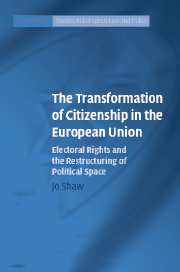 The Transformation of Citizenship in the European Union
The Transformation of Citizenship in the European Union Book contents
- Frontmatter
- Dedication
- Contents
- List of figures
- List of tables
- Preface and acknowledgments
- PART I Electoral rights in legal and political context
- PART II The past, present and future of EU electoral rights
- PART III The contestation of electoral rights in the Member States of the European Union
- 8 National politics of immigrant inclusion: the extension of electoral rights to resident non-nationals
- 9 Electoral exclusion, models of citizenship and the contestation of belonging
- 10 Out of Empire: electoral rights, enlargement and the wider Europe
- PART IV Conclusions
- Bibliography
- Index
9 - Electoral exclusion, models of citizenship and the contestation of belonging
from PART III - The contestation of electoral rights in the Member States of the European Union
Published online by Cambridge University Press: 05 June 2015
- Frontmatter
- Dedication
- Contents
- List of figures
- List of tables
- Preface and acknowledgments
- PART I Electoral rights in legal and political context
- PART II The past, present and future of EU electoral rights
- PART III The contestation of electoral rights in the Member States of the European Union
- 8 National politics of immigrant inclusion: the extension of electoral rights to resident non-nationals
- 9 Electoral exclusion, models of citizenship and the contestation of belonging
- 10 Out of Empire: electoral rights, enlargement and the wider Europe
- PART IV Conclusions
- Bibliography
- Index
Summary
Introduction
The restriction of electoral rights (especially but not only the right to vote in national elections) exclusively to those holding the national citizenship of a given state remains a rather common state practice, as we saw in Chapter 3. The most substantial ‘exception’ stems, of course, from the equal treatment rights granted to EU citizens in relation to local and European Parliamentary electoral rights under Article 19 EC, which now extend to twenty-seven Member States. In addition, as we have observed in the previous chapter, there are a number of important exceptions to the restriction of electoral rights to non-nationals, especially in relation to local electoral rights. Perhaps it is precisely because the denial of rights remains the status quo that the arguments in favour of the restrictive position tend to be less sharply defined in both political and academic discourse than the arguments for opening up the franchise. Where such arguments are explicitly articulated, they tend to concentrate on emphasising the normative and instrumental desirability of maintaining the incentive for non-nationals to acquire national citizenship. Voting rights, at every level, are seen on that argument as a reward for achieving a sufficient level of integration in terms of residence periods, affinity with the new state, and passing of all conditions such as naturalisation tests, especially those concerning language. They cannot be seen as part of the gradual process whereby nonnationals are made to feel ‘at home’ and thus acquire the inclination to seek national citizenship.
It is perhaps unfortunate that some of the states which have the most restrictive rules on the acquisition of nationality have also been the most restrictive in relation to expanding the boundaries of the suffrage. Germany and Austria, for example, have both had ethno-culturally driven definitions of national citizenship acquisition principally by descent (ius sanguinis) and restrictive rules on citizenship acquisition by naturalisation. In terms of the relationship between citizenship and nation state, each broadly conforms to Rogers Brubaker's model of the ‘ethnic’ nation (Brubaker, 1992).
- Type
- Chapter
- Information
- The Transformation of Citizenship in the European UnionElectoral Rights and the Restructuring of Political Space, pp. 285 - 319Publisher: Cambridge University PressPrint publication year: 2007


